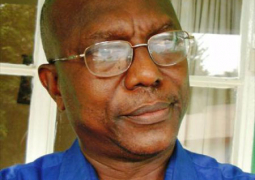As they left Alkatan’s hut, the woman said something that made the tears fall in Alkatan’s heart. Walking a step behind him, the woman told Alkatan how when she heard what happened that morning, she went to Afang Hadumeh’s shop to beg him to untie her husband and how the afang beat her up with a stick.
“When he saw me he said I should go away. When I did not go and kept begging him, he took a big stick and said if I don’t go away he will beat me. I told him I just came to beg him to let my husband go because he is sick. He got angry and came over and hit me hard with the stick, twice, on my back. I refused to leave and he was going to hit me again but some people held him, and someone said to me, you just go; go and tell Alkatan; he will come and help you. That’s when I left and came here but you were not home; and I waited till you came. Right now my back is swollen and I’m feeling a lot of pain. But I cannot rest until he unties my husband. I’m afraid that he will die because he is very sick. And when he dies what will I do with our children? We have six young children Alkatan. Right now they are all alone at home. They did not even have breakfast . . .”
Alkatan listened and the tears flowed in his heart and he did not say anything to the woman apart from groaning once in a while to indicate that he was listening. Alkatan had seen a lot and heard a lot in his lifetime; and he had thought a lot about life itself and about human beings. He had long lost the capacity to get angry or to wish to punish somebody. But he could never lose the disturbing feeling that human beings are capable of causing so much pain to their fellow human beings. He could not understand how people fail to see that whenever they wrongfully hurt somebody, they hurt themselves even more. For while people can do cruel things to others and go home and sleep through the night, they inevitably suffer the consequences of their cruel actions, and those consequences are abiding and relentless. People are able to momentarily repress their consciences and convince themselves with convenient truths; but ultimately they suffer when at some point and as sure as death, the pressure cookers of their consequences explode and flood their beings with the bitter pain of guilt and regret, when it was too late to regret. And sometimes, they suffer physically too, as did Degere and Chief Hulibot, in addition to the suffering inflicted by their unforgiving, troubled and guilty consciences.
As they approached Afang Hadumeh’s shop, they saw a small crowd of people standing outside, some holding their mouths, some their hands on their backs, all of them quietly staring at a spot near the door. They spotted Afang Hadumeh himself sitting on a chair under the shop’s verandah and as they got closer, they heard the repeated groans of the woman’s husband who lay in a tight bundle on the floor of Afang Hadumeh’s shop, just near the large entrance. As soon as Afang Hadumeh saw the woman, he sprang up from his chair and wagging his finger at her, angrily demanded to know why she was there again. The woman responded, “Afang Hadumeh, I just came back to beg you to look at God and untie my husband. I have come with Alkatan so he can beg you too.”
“Not even Alkatan can make me untie your husband until he pays me. He must fulfil our agreement or he will remain tied and he will spend the night right here. But where is the Alkatan you said you have come with? Are you calling that mad man Alkatan? Is that not the mad man who lies on the ground at the Bantaba? What do they call him again, Lakara?”
“No,” the woman responded, touching Alkatan’s arm. “This is not Lakara the mad man; this is Alkatan. Do you not recognize him?”
“I will recognize Alkatan even in the middle of a dark night. I know him very well. Who does not know Alkatan here in Tonya Kunda? Even if this man is not Lakara, he is not Alkatan and if you think bringing this old man – whoever he is - will cause me to release your husband without my money, you have lost your mind. Even if you bring Alkatan himself, your husband must pay my money or remain tied up! Do you think Alkatan owns me?”
“This woman’s husband, how much does he owe you Afang?” Alkatan asked.
“How much he owes me? 450 dalasi, that’s what he owes me!” Afang Hadumeh fired, glaring at Alkatan. “He came here begging me, saying his family had nothing to eat! I gave him a loan of 300 dalasi! He agreed to pay me 450 dalasi! Then when the time came for him to pay, he started hiding from me! If I send somebody to his compound or if I go there myself, his wife always said he was not home! I even went inside their house several times and looked under the bed and everywhere but I did not find him! In the end I was tired and waited here because I knew he would come! One day he came and paid me 300 dalasi! That was almost one year ago and he still has not paid the remaining 150 dalasi! When I send someone to ask, he would say he is sick, he is sick, he is sick! Did I make him sick? Today he will pay me or he will spend the night here, tied up!”
“But Afang,” Alkatan said. “He took 300 from you and he has paid you 300. Why should he pay you an additional 150 dalasi?”
“That was the agreement between us,” Afang Hadumeh replied. “Ask anybody in Tonya Kunda. If I give you 100, you pay me 150; if I give you 150 you pay me 200; if I give you 200 you pay me 300; if I give you 300 you pay me 450! That’s how I run my business because business is business! It is looking for money! I will not untie him until he pays me!”
“I think you should untie him now, Afang and he will pay you when he can,” Alkatan said, calmly.
“That will not happen here! I will not do that!” Afang Hadumeh shouted. “And if you two don’t leave my shop right now you will see what happens to you! It’s only because you are an elder that I’m talking to you. You and his wife should pay me now or leave my shop before I get angry with you!”
“Untie him now and I will make sure he pays you this evening,” Alkatan said. He must give this man enough reason to untie the woman’s husband and go in peace. But he knew that the man was beyond peace. He was already in the realm of abiding pain and would not see reason at this point. And so he was not surprised when Afang Hadumeh refused to budge and retorted, “I won’t do that!”
“Aha,” Alkatan said. “Then untie him and we will pay you now.”
“Pay me first. I will only untie him if I hold my money in my hand,” Afang Hadumeh insisted.
“Aha,” Alkatan said. “We will pay you now; but if you take the payment before untying this woman’s husband you will not be happy tomorrow. If you untie him before taking the payment you will not be unhappy tomorrow.”
Afang Hadumeh laughed, that cold laughter that comes from a heart that could only laugh because it thinks the other person is just a nobody saying nothing.
“Are you deaf?” he asked Alkatan, mockingly. “I said I will not untie him until I hold my money in my hand! Even if the angels come down here I will only untie him if I get my money in my hand!”
“Aha,” Alkatan said as he dipped his hand into his pocket, took out some money and gave it to the woman and said, “take this and pay him.” The woman took the money, stepped forward and handed it to Afang Hadumeh. Satisfied that it was the right amount, Afang Hadumeh tucked the money into his pocket and asked a young man standing by to untie the man. Alkatan and the woman walked over and helped him stand up, then held his hand on either side as they walked out of the shop in silence. Alkatan dipped his hand into his pocket again and gave the woman more money and said, “you can go home now. Tomorrow you will hear that Afang Hadumeh is very unhappy.”




